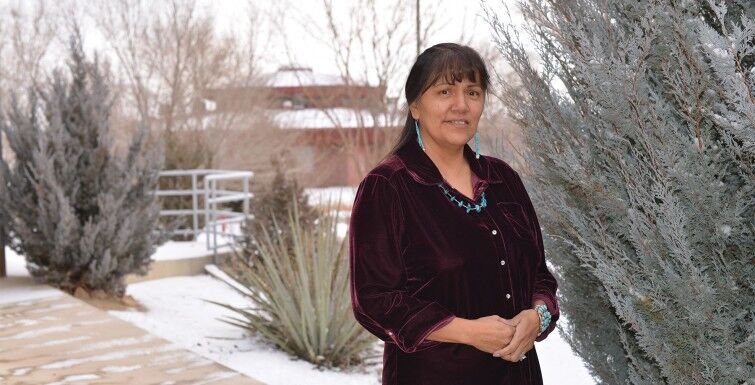Marcella on the campus of Navajo Technical University.
It’s hardly surprising that a story of strength and spirit will be found with someone who uses as their “Knowledge is Power” mantra.
Marcella has not had an easy life. She was primarily raised in the boarding school of Rough Rock, Arizona, and says relationships, consistency, and stability were not guarantees during her upbringing. With help from a sister’s open door, Marcella is now settled into an enriching life in Crownpoint, New Mexico, where she and her husband live near a wide collection of family members.
Throughout her life and its struggles, Marcella says she has been graced with strong female role models and guides. She greatly admires her two sisters and attributes much of where she is today to their love, strength, and belief. “They have been there for me,” she says, “and I am there for them.” Whatever life required, whether a new home or encouragement, her sisters provided. Marcella also attributes her success to the supportive teachers and friends she has met at Navajo Technical University; where she pursues a bachelor’s degree in Native American studies.
Fueled by her support structure, Marcella plans to earn and use her degree to “provide a foundation for my children and a place to plant their roots,” unlike her own past. She recognizes the importance of both land and language revitalization in a culture where need is great but resources are scarce. She understands that roots cannot be sustained without maintaining cultural identity through language. Marcella says that is made even more important with a western way of life and culture being adopted by younger generations. Navajo Technical University and other cultural organizations have helped teach the importance and meaning of caring for the land and language of Navajo Nation while also learning and participating in the western world.
Marcella believes that education is a must to thrive in both the traditional and western worlds. The combination of both provides balance and protection to “bring a better way of living.” She says thanks to the American Indian College Fund, scholarships have saved “a tremendous amount of identity, culture, and traditions” for Native scholars across Indian Country.

